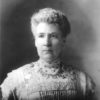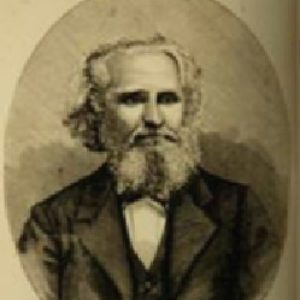calsfoundation@cals.org
Patrick Samuel Gideon Watson (1816–1890)
Patrick Samuel Gideon Watson, the father of Baptist history in Arkansas, was one of the state’s early itinerate ministers and the editor of Arkansas’s first religious newspaper in 1859.
Watson was born on May 2, 1816, in Falmouth, Kentucky, the son of local farmer Joseph Watson and Ann Anderson Watson. His writings indicate that he received an excellent classical education.
He married Catherine Oldham Harris on March 14, 1839, in Kentucky. They were the parents of eleven children, only three of which were living by the time the family moved to Texas in the 1870s.
In 1843, he was licensed to preach by the historic Forks of Licking Baptist Church in Falmouth. Shortly afterward, he and his family joined an emigrant party bound for Arkansas. He first settled near Reed’s Creek in Sharp County and spent the next twenty years working to establish churches throughout the state. During this period, he organized Baptist churches in Batesville (Independence County), Lexa (Phillips County), Marvell (Phillips County), Yellville (Marion County), and New Hope (Sharp County), many of which are still active. During his travels he collected material on the early history of Baptists in the state in hopes of writing a history. However, other than a few articles published at the time, his collection of church histories was lost during the Civil War.
About 1855, while living in Helena (Phillips County), he led a successful petition to outlaw the sale of liquor in the community. After leaving there, he settled in Little Rock (Pulaski County), where he taught school. In 1858, he organized a Baptist church in Little Rock. It ceased to exist during the war. In 1859, he began publication of Arkansas’s first religious newspaper, the Arkansas Baptist. The paper ceased publication in 1861.
During the Civil War, Watson’s thoughts turned to the study of end-time prophecy. Shortly afterward, he returned to his home state, where he founded a monthly magazine devoted to this subject and published at Versailles, Kentucky, called Prophetic Key. By 1877, he was living in Texas, where he finished his masterwork, titled Prophetic Interpretations, an independent exposition of many important prophecies of both the Old and the New Testaments. It was published in Turneville, Texas, in 1880. Between 1881 and 1882, Watson wrote a detailed account of his life and work in Arkansas called Reminiscences of Arkansas. It was serialized in the Little Rock Arkansas Evangel and is a valuable source for researching the history of antebellum Arkansas.
Watson died on July 2, 1890, in McGregor, Texas, and is buried next to his wife in the McGregor Cemetery.
For additional information:
Allsopp, Fredrick W. History of the Arkansas Press for a Hundred Years and More. Little Rock: Parke-Harper Publishing, 1922.
Ashcraft, Robert. Pioneer Faith: The History of Missionary Baptist Associations and Churches in Arkansas from 1818 to 1920. Malvern, AR: State Association of Missionary Baptist Churches in Arkansas, 1994.
“Rev. P. S. G. Watson.” Individual File. Arkansas State Archives, Little Rock, Arkansas.
“Rev. P. S. G. Watson.” (Little Rock) Baptist Advance, November 30, 1911.
Watson, Rev. P. S. G. “Baptist Churches—Phillips County, Arkansas.” American Baptist Memorial. Edited by Basil Manly. N.p.: 1855.
Russell P. Baker
Arkansas History Commission and State Archives
 Historic Preservation
Historic Preservation Louisiana Purchase through Early Statehood, 1803 through 1860
Louisiana Purchase through Early Statehood, 1803 through 1860 Patrick S. G. Watson
Patrick S. G. Watson 




Temperance:
Rev. Watson was regarded as a dedicated temperance fighter, as documented in articles written by him and about him, which have survived. He abstained from tobacco, as well as alcohol. A reprinted article, Reminiscences, quoted the lifelong minister, who stated As in Kentucky so in Arkansas, my anti-liquor principles were known as extensively as my name. A further quote from him was, I have not taken a dram in 53 years, nor has one ever been given in my family. The ministers health is mentioned in some of the articles. Although he was successful in encouraging the Arkansas legislature to pass a law prohibiting the use of alcohol, the legislation was overturned in subsequent years. The full article dealing with the liquor law and its repeal may be found in the Arkansas History Commission Archives. His apathy toward tobacco was also widely known. In 1915, Mrs. Lizzie Avirett, a self-described follower of Rev Watsons, choosing to elaborate on several of his prophetic theories, stated: The fumes of tobacco smoke were deadly to Mr. Watson, and yet he could not smell so that he was unable to enter any large auditorium, and thus was forced to give his great lectures in small towns Other commentators mentioned Rev. Watsons unwillingness to attend Conference meetings due to the abominable habit of smoking by other participants.
Civil War:
At the outbreak of the Civil War, it appears that Rev. Watson was asked to return to his home state of Kentucky. Confirmation of that fact was not learned from the Southern Baptist Mission Board. The fact that the Watsons departure from Arkansas for about 15 years, without a return there, but to a location in Texas, would indicate that their fate was determined by the parent organization that sent them into Arkansas initially, and that perhaps a determination was made to send them elsewhere after the Civil War and Reconstruction in the South was ended. The silent records in this timeframe would indicate the on-going struggle within the church bodies of how to handle the issues of the American Civil War.
A review of documents uncovered about the Watson family revealed that Rev. Watson had relinquished his slaves and his portion of family land obtained through his fathers will. If he had known in 1851 his later need for funds, he might not have so readily released a possible source of later income.
Death and Burial:
The date of Rev. Watsons death was found in an excerpt from the July 9, 1890, edition of The Texas Baptist and Herald. The death was reported to have occurred on July 2, 1890, at McGregor, Texas. On this date, he was known to have penned remarks regarding misinterpreted scripture regarding the rock. A visit to the graves of Rev. and Mrs. Watson was a strange experience; it was sad to see that they were buried in neglected graves. He had remarked in the preface to the first edition of Prophetic Interpretations, I have been wading through the depths of poverty! Although there is only a small concrete block erupting from the earth as headstones for Rev. and Mrs. Watson, a metal plate is fastened to each with their names and dates of birth and death. The exact date of death for Mrs. Watson was not learned.
Prior to learning the accurate date of Rev. Watsons death (the townspeople estimated it in the late 1880s), but believing that the Watsons were in the McGregor area during the latter part of 1880, contact was made with the McGregor Cemetery Association. The graves were located on Block 24, Lot 12, Spaces 7 and 8. Cedar trees were planted by the Cemetery Association over the 75 years following their deaths. Burials in the Shotwell Family Plot at the old cemetery, with the simple markers, indicate the reality of the poverty known to the couple throughout their lives.
Final Impressions:
Rev. Watson was undedicated to documenting himself and his family, so little is known about their travels from Kentucky to Arkansas and later to Texas, and what life was like for them during the Civil War. We can wonder about the probable hardships of taking a family into an unsettled country, the tasks of establishing churches in remote areas, and the loss of seven children in one decade. It is clear from the scarcity of information handed down about him through his family that they did not speak of their sufferings. The fact that he signed over all his share of family property from his father to his brother in Kentucky indicates his devotion to the calling as a minister, writer, teacher, and evangelist. Because of a passion for music of the church, one wonders if the primarily self-taught preacher was a singer of the old gospel tunes, a favorite avocation of his sons, grandchildren, and great-grandchildren. The results of his devotion were felt down into the 21st century, and his name has not been forgotten.